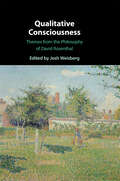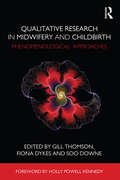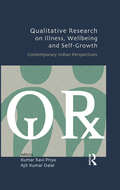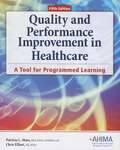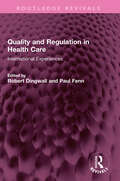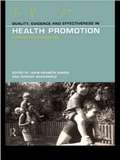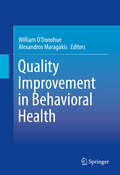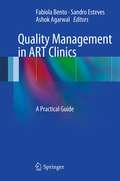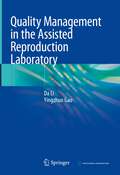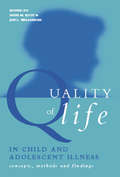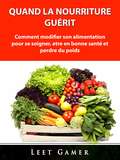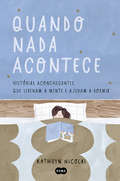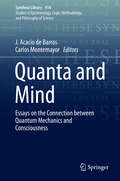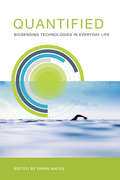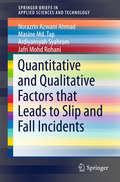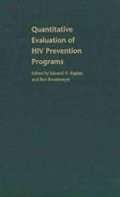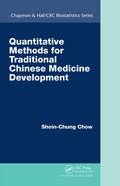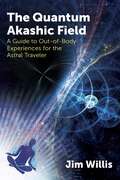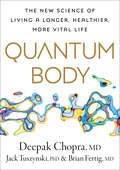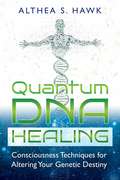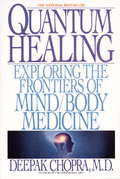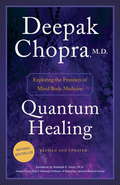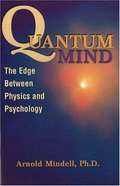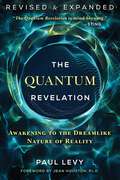- Table View
- List View
Qualia and Mental Causation in a Physical World
by Horgan, Terence and Sabatés, Marcelo and Sosa, David Terence Horgan Marcelo Sabatés David SosaHow does mind fit into nature? Philosophy has long been concerned with this question. No contemporary philosopher has done more to clarify it than Jaegwon Kim, a distinguished analytic philosopher specializing in metaphysics and philosophy of mind. With new contributions from an outstanding line-up of eminent scholars, this volume focuses on issues raised in Kim's work. The chapters cluster around two themes: first, exclusion, supervenience, and reduction, with attention to the causal exclusion argument for which Kim is widely celebrated; and second, phenomenal consciousness and qualia, with attention to the prospects for a functionalist account of the mental. This volume is sure to become a major focus of attention and research in the disciplines of metaphysics and philosophy of mind.
Qualitative Consciousness: Themes from the Philosophy of David Rosenthal
by Weisberg JoshQualitative consciousness is conscious experience marked by the presence of sensory qualities, like the experienced painfulness of having a piano dropped on your foot, or the consciousness of seeing the brilliant reds and oranges of a sunset. Over his career, philosopher David Rosenthal has defended an influential theoretical approach to explaining qualitative consciousness. This approach involves the development of two theories – the higher-order thought theory of mental state consciousness and the quality space theory of sensory quality. If the problem of explaining qualitative consciousness is divided into two more manageable pieces, the door opens to a satisfying explanation of what is seen by some to be an intractable explanatory puzzle. This interdisciplinary collection develops, criticizes, and expands upon themes inspired by Rosenthal's work. The result is an exciting collection of new essays by philosophers and scientists, which will be of interest to all those engaged in consciousness studies.
Qualitative Research in Midwifery and Childbirth: Phenomenological Approaches
by Soo Downe Gill Thomson Fiona DykesQualitative research, particularly phenomenology, is increasingly popular as a method for midwifery and health-related research. These approaches enable rich and detailed explanations to be uncovered and bring experience to life. Important recommendations and practice- based implications may then be raised and debated for future use. This book brings together a range of phenomenological methods and insights into one accessible text. Illustrated with plenty of examples of successful phenomenological research, Qualitative Research in Midwifery and Childbirth keeps the focus applied to midwifery and childbirth and makes clear the links to practice throughout. The book introduces three key phenomenological approaches – descriptive, interpretive and the life world – and includes a comparative chapter which discusses the differences between these varied perspectives and methods. Each chapter focuses on how these approaches are used within midwifery research. The remaining chapters present a number of different research projects. These demonstrate how different phenomenological approaches have been used to explore and uncover experiences of childbirth and maternity as well as offering important insights into how women experience different facets of the birth experience during the antenatal, intra-partum and postnatal period. Designed for researchers and students undertaking research projects on midwifery and childbirth, this text includes contributions from a range of international and highly regarded phenomenological authors and researchers.
Qualitative Research on Illness, Wellbeing and Self-Growth: Contemporary Indian Perspectives
by Kumar Ravi Priya Ajit Kumar DalalThis book examines the theoretical, methodological and practical dimensions of Qualitative Research in the study of illness, wellbeing and self-growth in the Indian context. Using wide-ranging narratives, interviews, group discussions, and cultural analyses, it offers a social and psychological understanding of health and therapy.
Quality and Performance Improvement in Healthcare: A Tool for Programmed Learning
by Patricia L. Shaw Chris ElliottThis is the fifth edition of the best-selling Quality and Performance Improvement in Healthcare: A tool for Programmed Learning. Covering trends in healthcare quality control and performance, it also serves as a solid source on Performance Improvement (PI) foundations, fundamentals, and core principles.
Quality and Regulation in Health Care: International Experiences (Routledge Revivals)
by Robert Dingwall Paul FennFirst published in 1992, Quality and Regulation in Health Care employs socio-legal ideas concerning regulation to examine the methods used to influence the quality of health care in the US, UK, and Western Europe. Throughout the Western world, health care systems, both public and private, are grappling with the problems of assuring quality while containing costs. On the one hand, governments and insurers argue that there must be some limit to the apparently endless growth of health care expenditures. On the other, patient groups and consumer advocates, already dissatisfied by the problems in holding doctors accountable for their actions, protest that such limits must not result in sick people getting inferior treatment. This book examines in detail the debate surrounding the question: How can the professional expertise of the clinicians be reconciled with the preferences of their patients and the economic concerns of taxpayers or insurers? It will be essential reading for graduate and undergraduate courses in health policy, medical sociology, and health law.
Quality, Evidence and Effectiveness in Health Promotion: Striving For Certainties
by John Kenneth Davies Gordon MacdonaldQuality, Evidence and Effectiveness is unique in bringing together, for the first time, the critical concepts of quality assurance and effectiveness in relation to health promotion and research.Contributions from leading health promotion specialists around the world discuss how best to push forward evidence of the value of health promotion as an effective investment strategy. They examine particular examples of health promotion interventions, focusing on both practical suggestions and the concepts underlying them.Contributions are divided into three core sections:* the examination of effectiveness studies through the application of different evaluation methodologies * practice-based quality assurance programmes * the examination of examples of health promotion interventionsQuality, Evidence and Effectiveness will be invaluable to students, researchers and policy-makers in health promotion and all professionals who are committed to the effective and efficient delivery of New Public Health.
Quality Improvement in Behavioral Health
by William O'Donohue Alexandros MaragakisThis innovative volume presents a cogent case for quality improvement(QI) in behavioral healthcare as ethical practice, solid science, and goodbusiness. Divided between foundational concepts, key QI tools and methods, andemerging applications, it offers guidelines for raising care standards whileaddressing ongoing issues of treatment validity, staffing and training, costsand funding, and integration with medical systems. Expert contributors reviewthe implications and potential of QI in diverse areas such as treatment ofentrenched mental disorders, in correctional facilities, and within theprofessional context of the American Psychological Association. The insights,examples, and strategies featured will increase in value as behavioral healthbecomes more prominent in integrated care and vital to large-scale health goals. Included in the coverage: Behavioral health conditions: direct treatment costs and indirect social costs. Quality improvement and clinical psychological science. · Processmapping to improve quality in behavioral health service delivery. · Checklists for quality improvement and evaluation in behavioralhealth. · Creating a quality improvement system for an integrated careprogram: the why, what, and how to measure. · Feedback Informed Treatment (FIT): improving the outcome ofpsychotherapy one person at a time. Quality Improvement i n Behavioral Healthcare gives healthpsychologists, public health professionals, and health administrators areal-world framework for maintaining quality services in a rapidly evolvinghealth landscape.
Quality Management in ART Clinics
by Fabiola Bento Sandro Esteves Ashok AgarwalIn the last decades, major advances have been made in assisted reproductive technologies (ART) and the public demand for these procedures has increased globally. All ART clinics, from those just starting out to the well established, must employ the latest equipment and implement the best practices, while ensuring that their resources are effectively engaged to optimize patient outcomes. This is a tenet of the fiduciary role of physicians and it is increasingly recognized as a quantifiable goal regulated by formal certifications and accreditations. Quality management protocols such as those proposed by the International Organization for Standardization (ISO) are being rapidly adopted as standards of measure. Quality Management in ART Clinics: A Practical Guide provides easily adoptable ways to implement and improve formalized quality management systems. Essential to any clinic to achieve best practices and maintenance of formal regulatory certifications, this book brings together the know-how of experienced opinion leaders operating in key areas worldwide. The book offers an overview of primary regulations in the ART field, with attention to quality management demands, and links specific requirements to practical steps for implementation. Filled with process and procedure examples, flow diagrams and administrative form templates, this book is the first of its kind, gathering the necessary elements for optimizing practice, management, and quality assurance.
Quality Management in the Assisted Reproduction Laboratory
by Da Li Yingzhuo GaoThis book provides readers up-to-date information on various aspects affecting assisted reproduction laboratories and corresponding management approaches, based on latest literatures, clinical practice, and international consensus. Key points of laboratory environment, laboratory operations and quality control measures are presented in details. Last but not least, ethical issues and countermeasures of assisted reproductive technology are discussed. It will be a practical and reader-friendly resource to help reproductive medicine practitioners establish a disciplined risk and control system for assisted reproduction laboratories and techniques.
Quality of Life in Child and Adolescent Illness: Concepts, Methods and Findings
by Hans M. Koot Jan L. WallanderHow can we measure the quality of life in children and adolescents with chronic disease? Major progress in the diagnosis and treatment of severe and chronic disease has led to an increased number of children and their families having to adapt and cope with the impact of disease, survival, and the cost of treatment. Health professionals have responded to this by developing a diversity of instruments for measuring quality of life for use in paediatrics, psychology and public health. This book introduces the reader to the emerging field of quality of life assessment and provides a comprehensive overview of the conceptual and methodological issues concerning quality of life in child and adolescent illness. Particular emphasis is provided on current efforts to measure the impact of specific chronic conditions on different domains of child functioning. Future directions are outlined for the development of appropriate instruments for measuring quality of life in children and adolescents. Quality of Life in Child and Adolescent Illness is intended for psychologists, paediatricians, paediatric nurses, child psychiatrists, public health professionals, researchers and other interested readers from the undergraduate to the working professional.
Quand la nourriture guérit: Comment modifier son alimentation pour se soigner, etre en bonne santé et perdre du poids
by Maria SoaresVoudriez-vous pouvoir éliminer les maladiesd, les sensations de malaise, les inflammations, la douleur et la dépression? Depuis toujours les techniques de guérison naturelles sont utilisées pour soigner de nombreuses affections! L'utilisation de techniques de guérison naturelle est aussi utile concernant les maladies chroniques, les états inflammatoires, le système immunitaire, le niveau d'énergie, de concentration, le bonheur et beaucoup d'autres choses! Après avoir introduit dans votre vie les secrets de la médecine naturelle, vous vous sentirez plus en forme que jamais! Cet ouvrage dont l'efficacité est démontrée depuis de très nombreuses années va vous montrer quelle est la façon la plus rapide et la plus efficace de vous servir de la médecine naturelle pour faire mieux fonctionner votre thyroide et améliorer votre bien-etre! En quelques semaines seulement, vous allez apprendre à améliorer votre bien-etre. Et ce n'est pas tout, toute votre vie va en bénéficier. Vous voudriez savoir comment affronter des maladies chroniques et des affections? Vous pouvez vous aussi apprendre des secrets qui vous permettront de le faire et d'etre plus heureux et en meilleure santé. Ce guide va vous illustrer des techniques scientifiquement prouvées sans que vous ayez besoin d'avoir recours à des suppléments ou à des cours couteux. Qu'est-ce qu'il comprend: - Des remèdes - Se débarrasser des maladies chroniques - Avoir plus d'énergie - Mieux dormir - Se débarrasser des affections - Nutrition - Ce que vous devriez savoir - Beaucoup plus encore! Si vous voulez mieux vous porter, vous débarrasser des maladies, avoir une meilleure concentration & bien-etre, alors ce guide est pour vous. Retournez en haut de la page et cliques pour l'ajouter immédiatement à votre panier. Avertissement L'auteur et les détenteur
Quando nada acontece: Histórias aconchegantes que serenam a mente e ajudam a dormir
by Kathryn Nicolai Léa Le PivertHistórias aconchegantes que sossegam a mente e ajudam a dormir. As mentes ocupadas precisam de um lugar seguro para descansar. Se tem problemas para adormecer, acorda a meio da noite preocupado, ou fica ansioso durante o dia, este livro pode ser a solução. Em Quando nada acontece Kathryn Nicolai oferece uma forma saudável para sossegar a mente antes de dormir através do apelo intemporal das histórias de adormecer, numa versão para adultos. As histórias acontecem dentro e de uma cidade fictícia, cada uma revelando pequenos e doces momentos de alegria que se encontram no lugar-comum. À medida que os narradores sem nome e sem género contam os seus dias, evocam os distintos confortos oferecidos por cada uma das quatro estações e gentilmente acalmam o leitor até o sono. Desde celebrar a natureza e se deleitar com a alegria, ou ficar sozinho em casa, até o prazer de se perder nas estantes da biblioteca ou escolher o melhor tomatena feira, este tesouro tem algo para todos. Também encontrará dezasseis novas histórias nunca antes apresentadas no podcast Nothing Much Happens, junto com ilustrações, receitas e meditações. Com décadas de experiência como professora de meditação e ioga, Kathryn Nicolai cria um mundo para entrar, um mundo rico em experiências sensoriais que silenciosamente ensina a atenção plena e autocompaixão, acalma a ansiedade e cria hábitos sólidos para um bom sono. Os elogios da crítica: «Uma coleção encantadora de quase-contos que pretendem ser um antídoto para a insónia e a inquietação. Nicolai realiza o que nenhum outro autor gostaria de ouvir: essas histórias podem fazer as pessoas dormirem.»Publishers Weekly «Esta coleção de contos muito curtos foi projetada para ajudar os leitores a adormecer e ter um sono reparador. As histórias seguem as estações, a começar com o Inverno, e dependem muito dos sentidos; há muitos cheiros adoráveis,coisas suaves e confortáveis e comidas deliciosas, todos descritos em detalhes e muitas vezes acompanhados por ilustrações em tons suaves. São temperadas receitas, meditações e outras técnicas de relaxamento. As histórias têm sucesso no seu objetivo de ajudar os leitores a dormir melhor.» Booklist
Quanta and Mind: Essays on the Connection between Quantum Mechanics and the Consciousness (Synthese Library #414)
by Carlos Montemayor J. Acacio de BarrosThis edited volume examines aspects of the mind/consciousness that are relevant to the interpretations of quantum mechanics. In it, an international group of contributors focus on the possible connections between quantum mechanics and consciousness. They look at how consciousness can help us with quantum mechanics as well as how quantum mechanics can contribute to our understanding of consciousness. For example, what do different interpretations aimed at solving the measurement problem in quantum mechanics tell us about the nature of consciousness, such as von Neumann's interpretation? Each interpretation has, associated to it, a corresponding metaphysical framework that helps us think about possible “models” of consciousness. Alternatively, what does the nature of consciousness tell us about the role of the observer and time reversibility in the measurement process? The book features 20 papers on contemporary approaches to quanta and mind. It brings together the work of scholars from different disciplines with diverse views on the connections between quanta and mind, ranging from those who are supportive of a link between consciousness and quantum physics to those who are very skeptical of such link. Coverage includes such topics as free will in a quantum world, contextuality and causality, mind and matter interaction, quantum panpsychism, the quantum and quantum-like brain, and the role of time in brain-mind dynamics.
Quantified: Biosensing Technologies in Everyday Life
by Dawn NafusWhat is at stake socially, culturally, politically, and economically when we routinely use technology to gather information about our bodies and environments? Today anyone can purchase technology that can track, quantify, and measure the body and its environment. Wearable or portable sensors detect heart rates, glucose levels, steps taken, water quality, genomes, and microbiomes, and turn them into electronic data. Is this phenomenon empowering, or a new form of social control? Who volunteers to enumerate bodily experiences, and who is forced to do so? Who interprets the resulting data? How does all this affect the relationship between medical practice and self care, between scientific and lay knowledge? Quantified examines these and other issues that arise when biosensing technologies become part of everyday life.The book offers a range of perspectives, with views from the social sciences, cultural studies, journalism, industry, and the nonprofit world. The contributors consider data, personhood, and the urge to self-quantify; legal, commercial, and medical issues, including privacy, the outsourcing of medical advice, and self-tracking as a “paraclinical” practice; and technical concerns, including interoperability, sociotechnical calibration, alternative views of data, and new space for design.ContributorsMarc Böhlen, Geoffrey C. Bowker, Sophie Day, Anna de Paula Hanika, Deborah Estrin, Brittany Fiore-Gartland, Dana Greenfield, Judith Gregory, Mette Kragh-Furbo, Celia Lury, Adrian Mackenzie, Rajiv Mehta, Maggie Mort, Dawn Nafus, Gina Neff, Helen Nissenbaum, Heather Patterson, Celia Roberts, Jamie Sherman, Alex Taylor, Gary Wolf
Quantitative and Qualitative Factors that Leads to Slip and Fall Incidents
by Norazrin Azwani Ahmad Masine Md. Tap Ardiyansyah Syahrom Jafri Mohd RohaniThis book investigates the factors that lead to slip and fall incidents and establishes a relationship between the coefficient of friction (COF), floor slipperiness and floor roughness. It also examines human perception of slipperiness through measured coefficient of friction (COF). On the basis of questionnaire surveys among manufacturing workers, it identifies potential risk factors and assesses human perceptions of slipperiness. It also uses a tribology approach to relate the interaction between contaminants, floor and footwear materials.
Quantitative Evaluation of HIV Prevention Programs
by Edward H. Kaplan Ron BrookmeyerThis book shows the quantitative evaluation of HIV issues.
Quantitative Methods for Traditional Chinese Medicine Development (Chapman And Hall/crc Biostatistics Ser.)
by Shein-Chung ChowA Western-Based Approach to Analyzing TCMsIn recent years, many pharmaceutical companies and clinical research organizations have been focusing on the development of traditional Chinese (herbal) medicines (TCMs) as alternatives to treating critical or life-threatening diseases and as pathways to personalized medicine.Quantitative Methods for Tradit
The Quantum Akashic Field: A Guide to Out-of-Body Experiences for the Astral Traveler
by Jim WillisA first-hand exploration of how to consciously step out of your body and navigate the Quantum Akashic Field • Details a step-by-step process of engaging extrasensory, out-of-body travel • Examines the quantum landscape of the Akashic Field, meetings with spirit guides, and descriptions of out-of-body experiences from the author&’s personal journal and from world spiritual traditions, including the Bible and the Baghavad Purana • Explores current theories about the science of consciousness and sensory perception, including discoveries from quantum physics, and how these discoveries align with the traditional wisdom of shamans, dowsers, and mystics Physicists have recently discovered a whole quantum-based reality, a multidimensional world where all potentials simultaneously exist. Called the Akashic Field by systems scientist Ervin Laszlo, it is the same quantum reality that mystics, shamans, and dowsers have been exploring for thousands of years through astral travel, spirit journeying, and energy work. Revealing how to gain awareness of the Quantum Akashic Field through conscious out-of-body experiences (OBEs), Jim Willis shares fascinating firsthand accounts taken from the detailed OBE journals he has kept for nearly 10 years, alongside analysis of recent discoveries in quantum physics and wisdom from the world&’s spiritual traditions. He details his own experiences with a wide variety of astral beings, spirit guides, landscapes, laws, and activities that he encountered in the Quantum Akashic Field. Drawing on scientifically-based principles that underlie the very nature of biological life, he explains how the brain is an organizer, not a producer, of consciousness. He explores the difference between dreams, visions, and OBEs and powerful ways to harness the imagination. Detailing a step-by-step process centered on safe, simple meditative techniques, Willis shows how to bypass the filters of your five senses while still fully awake and aware and engage in extrasensory, out-of-body travel. Sharing his journey to connect with universal consciousness and navigate the quantum landscape of the Akashic Field, he reveals how conscious OBEs allow you to penetrate beyond normal waking perception into the realm of quantum perception.
Quantum Body: The New Science of Living a Longer, Healthier, More Vital Life
by Deepak Chopra Jack Tuszynsk Brian FertigJoining forces with two leading scientists, New York Times bestselling author Deepak Chopra offers a quantum leap for improving our physical and mental health. In an unprecedented collaboration between three of today&’s most powerful minds, Deepak Chopra, M.D., teams up with physicist Jack Tuszynski, Ph.D., and endocrinologist Brian Fertig, M.D., to bring readers a visionary work that delves into the innovative world of quantum science and shows how unlocking its secrets can revolutionize how we live and age—and, ultimately, how we can eradicate disease. The key is the quantum body. Unlike our physical body, which is subject to aging, injury, and decay, the quantum body exists on a sub-atomic level and is the infinite, invisible source of everyday reality that affects your thoughts, feelings, sensations, and biological responses. Without your quantum body, there is no physical body. And this lack of awareness of the most crucial part of ourselves negatively impacts our lives every day. Through a powerful combination of prescriptive exercises and innovative research into the quantum world, the authors unveil seven breakthroughs that will revolutionize the future of everyone&’s well-being. Central to this revolution is a groundbreaking understanding of metabolism—the way our cells process energy—that promises to challenge our understanding of modern medicine as we know it.Though all too familiar in the physical world, Alzheimer&’s, type 2 diabetes, cancer, and heart disease do not exist at the fundamental level of quantum reality. By harnessing the power of the quantum body, we can significantly improve our physical and mental well-being, including supporting healthy cell, tissue, and organ function, boosting immunity, promoting mental resilience, and expanding our understanding of what it means to live a happy and purposeful life.In this groundbreaking book, Chopra, Tuszynski, and Fertig show you the way by unveiling the &“real&” reality of your body and mind as never before and providing a vision for a tomorrow that is already here.
Quantum DNA Healing: Consciousness Techniques for Altering Your Genetic Destiny
by Althea S. HawkHow consciousness and quantum energies affect your genetic expression and the development of disease and chronic health conditions• Draws on cellular medicine, genetics, quantum physics, and consciousness studies to define the real underlying mechanisms of disease and how they can be addressed • Explains how consciousness influences quantum DNA to erase the genetic imprint of illness, allowing your body to remember how to function efficiently and effectively• Shares the author’s discoveries that enabled her to successfully heal the cellular dysfunction at the root cause of her cancer, tumors, chronic inflammation, and toxicity• Explores consciousness tools to re-encode DNA and includes detailed scripts for techniques that readers can apply to their own healing journeysDrawing on new advancements in quantum physics, cellular medicine, genetics, and consciousness studies, as well as her own journey of self-healing from a number of challenging health conditions, Althea S. Hawk reveals how you can consciously influence your DNA and re-encode it to improve your health and alter your genetic destiny.Sharing the discoveries that enabled her to successfully heal from her cancer, tumors, toxicity, and inflammatory-related conditions, the author explains how genes are not solely responsible for creating disease. She shows how human physiology interacts with the quantum energies of our external and personal environments and how the resulting information triggers the development and persistence of disease and chronic conditions. We each inherit susceptibilities, but it is our unique experience of these environmental factors, as well as our beliefs, thoughts, and emotions, that alter the way our genes are expressed. Detailing how our DNA is both quantum-energetic and biological-chemical, Hawk explains how your environment and your consciousness influence your quantum DNA, which in turn interacts with your biological DNA. By working directly with energetic information that affects how your quantum and biological DNA communicate, you can alter the expression of your genes by re-encoding the gene sequences on your physical DNA, erasing the imprint of illness and enabling your body to remember how to function properly.Hawk explores consciousness tools and mind-body techniques to re-encode your DNA, such as sound and breathing work, DNA marker removal, recalibration of Akashic information, and cellular communication exercises that readers can apply to their own healing journeys.
Quantum Healing
by Deepak ChopraHere is an extraordinary new approach to healing by an extraordinary physician-writer -- a book filled with the mystery, wonder, and hope of people who have experienced seemingly miraculous recoveries from cancer and other serious illnesses.Dr. Deepak Chopra, a respected New England endocrinologist, began his search for answers when he saw patients in his own practice who completely recovered after being given only a few months to live. In the mid-1980's he returned to his native India to explore Aruyveda, humanities most ancient healing tradition. Now he has brought together the current research of Wetern medicine, neuoscience, and physics with the insights of Ayurvedic theory to show that the human body is controlled by a "network of intelligence" grounded in quantum reality. Not a superficial psychological state, this intelligence lies deep enough to change the basic pattenrs that design our physiology -- with the potential to defeat cancer, heart disease, and even aging itself. in this inspiring and pioneering work, Dr. Chopra offers us both a fascinating intellectual journey and a deeply moving chronicle of hope and healing.From the Trade Paperback edition.
Quantum Healing (Revised and Updated): Exploring the Frontiers of Mind/Body Medicine
by Deepak ChopraTHE LANDMARK BESTSELLER--NOW COMPLETELY REVISED AND UPDATED More than twenty-five years ago, Quantum Healing helped transform Deepak Chopra into a cultural phenomenon. Now Dr. Chopra, hailed by Time as "the poet-prophet of alternative medicine," returns to this groundbreaking work, adding the latest scientific research as well as expanded thoughts on the connection between body and mind. Inspired by the unexplained recovery of patients in his own practice who had been given just a few months to live, Dr. Chopra began his search for answers. After returning to his native India to explore humanity's most ancient healing tradition, Ayurveda, he combined those insights with Western medicine, neuroscience, and physics. What he discovered--a "network of intelligence" in the human body with the potential to defeat cancer, heart disease, even aging itself--forms the basis of Quantum Healing. In this new edition, Dr. Chopra once again offers a fascinating intellectual journey and a deeply moving chronicle of hope and healing. Praise for Quantum Healing "Quantum Healing didn't set out to cure cancer or Alzheimer's or any other intractable disease. It set out to see the human body, and human existence in general, through wiser eyes. As a scientist I'm passionate about genes and the brain; as a person I'm totally fascinated by the origins of consciousness. Quantum Healing galvanized my intuition that these areas do not have to be separated."--Dr. Rudolph Tanzi, from the new foreword "Deepak Chopra illuminates our true innate capacity for healing, growth, and evolution. With the wisdom of an experienced doctor, girded by science, he guides us to reclaim our natural power towards thriving. Chopra's work is paradigm-changing for medicine and helpful beyond measure for every human being seeking to evolve, flourish, and know our true nature."--Lisa Miller, Ph.D., author of The Spiritual Child and director of clinical psychology, Teachers College, Columbia University
Quantum Mind: The Edge Between Physics and Psychology
by Arnold MindellBy exploring principles found in psychology, math, physics, and shamanism, it becomes possible to link a cosmic perspective with ordinary life.
The Quantum Revelation: Awakening to the Dreamlike Nature of Reality
by Paul Levy• Shows how the revelations emerging from quantum physics can wake us up from the disempowering spell of the scientific materialist worldview and help dispel the collective madness that has befallen our species• Explains for readers with no physics background why quantum physics is, in the words of Albert Einstein, so &“uncommonly important&” that &“it should be everyone&’s concern&”• Shows how quantum physics can help us awaken to the malleable, dreamlike nature of reality, a realization that unlocks the creative spirit within usExplaining the world-transforming effects of quantum physics, Paul Levy shows how discoveries in this field—widely considered the greatest in the history of science—can wake us up from the disempowering spell of the reductionist, materialist worldview, thereby helping to dispel the collective madness that has befallen our species. He explains how quantum physics helps us to consciously realize our vast evolutionary potential and awaken us to the malleable, dreamlike nature of reality, a realization that unlocks the creative spirit hidden within our own minds. In a radical synthesis of quantum physics with spirituality, psychology, lucid dreaming, and alchemy, Levy contemplates the deeper philosophical and metaphysical underpinnings of quantum mechanics, exploring what it means that quantum physics has empirically proven that there is no such thing as &“objective reality&” and how we are active participants in creating our experience of reality, whether we realize it or not.Revealing the quantum nature of our world and ourselves, The Quantum Revelation shows how quantum physics has become a modern-day spiritual path for awakening and expanding consciousness with particular relevance for the challenging times we are living through.

